5 Ways You Can Be A Better Leader In Foster Care
Do you often do things that feel wrong, yet you do them anyway until someone convinces you to change by asking tough questions? This is called cognitive dissonance and we all have it, yet a good leader will finally convince you to change. A good leader recognizes that when people get upset at tough questions, it usually means you are on the right track.
It is no secret the foster care system around the country is failing. However, there are good leaders in the system and we need more. It is clear to some of these leaders that something has to be done. For example, in the State of Kansas leaders have finally decided to act via a Task Force. This is a good start; however, it appears to be misguided as seen here: Child Welfare System Task Force; House Sub. For SB 126.
Let’s take a look at five ways you become a better leader in foster care and how they can be applied to the Kansas Task Force.
1. Go See (Go to the Gemba)
“The frequency of leadership going to the Gemba is inversely proportional to the number of walls separating them from the Gemba.” – Jon Miller
Gemba is a Japanese term meaning the real place. Essentially, the goal is to roll-up your sleeves and go to where the action is. In the case of foster care, leaders must go to the front lines. They must see what is actually happening with foster children and foster parents. There is no other way to understand the troubles they face. This should be simple, yet this is not being done in foster care. Whenever I speak with a foster parent or foster child who is doing exceedingly well, I always ask the question: “Has anyone in foster care asked you what you are doing?” The answer is always “No!”
Let’s take a look at the Kansas Task Force. A good leader would ask the following question: “Are the right people on the team?” If not, a good leader would then ask: “Why not?”
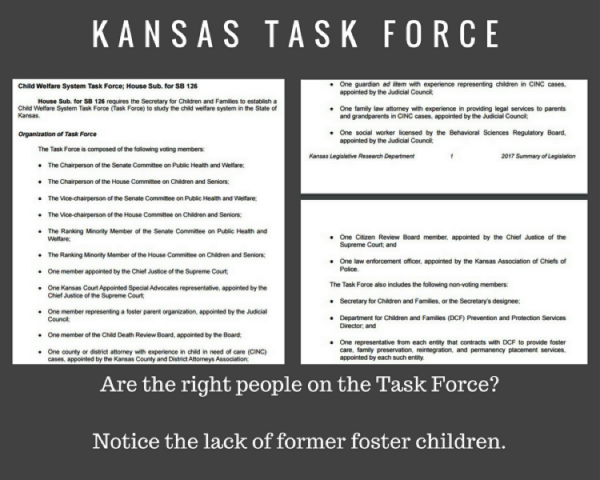
2. Ask Tough Questions
“Don’t shy away from asking tough questions. Go wherever the facts lead. If you ruffle feathers, so be it.” – Michael Copps
Good leaders, especially in foster care, do not shy away from asking tough questions. In fact, they enjoy them. One powerful technique we can use to bring out tough questions is the 5-Why technique (simply keep asking why!). Let’s look at three tough questions a foster leader has to address.
1. “Why don’t I live with mommy anymore?” Here is a tough question, one you shouldn’t B.S. your way through. Here is a great article on this exact question: Answering Children’s Questions about Foster Care
2. “Why are so many children entering foster care?” Here is a question where you have to dig deep. If you keep digging, you will find something interesting. This where it gets tough. For example, I recently wrote about Profiting from Foster Care. Let’s just say it got really interesting!
3. “Why won’t you give me my child’s medical records?” Here is a problem parents face when adopting from foster care. Most systems are organized so poorly that they fail to meet simple requests such as this… or they are purposely hiding something. Even if they are not, by failing to be transparent people will typically assume the worst. This is where a parent must be tough and continue to drill into this question.
3. Moon Shot Thinking
“Change is inevitable. Progress is optional.” – Tony Robbins
Leaders must understand the importance of change. We cannot change for the sake of change, but change for the better. In foster care, change is needed. Leaders can clearly see this, yet what changes have been made? What the system needs is a change agent. It needs a leader who isn’t afraid to think outside-the-box, it needs a leader who doesn’t see a problem hidden behind an opportunity, but one that sees an opportunity behind every problem.
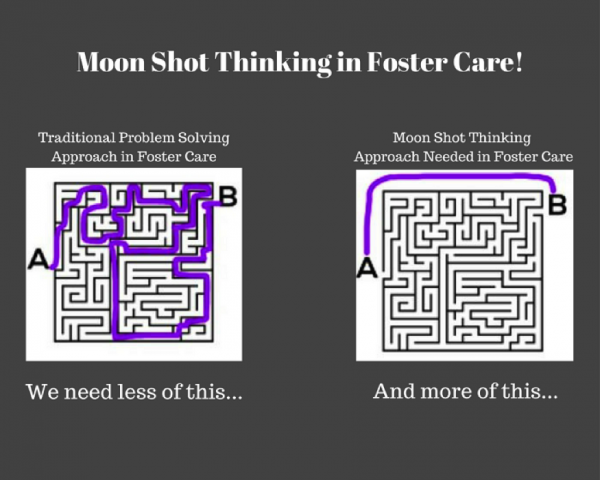
Foster care is in need of creative leaders seeking radical change–leaders who will turn the system completely on its head. What it needs are leaders who embrace Moon Shot Thinking. This is where we shoot for 10x the improvement over what currently exists. Moon Shot Thinking is the combination of a large problem, a radical solution, and breakthrough technology that just might make the solution possible. For those of you interested in learning more about this, visit the following link: Moonshot Thinking.
Here are few ideas to get the creative juices going for Moon Shot Thinkers in foster care.
1. Bachelor of Science in Foster Parenting. Essentially, this would create a Professional Foster Parent.
2. Lean Six Sigma / Continuous Process Improvement Program in Foster Care. As a Lean Six Sigma professional myself, this idea makes sense to me. Industry leaders like Amazon and GE use this program, why not give it a shot? It’s not as if lives depend on it.
3. Value Added Foster Care. This is a combination of the previous two ideas. Let’s create a program, where foster parents, social workers, and anyone working with foster children are paid and assessed on how well they do. Everything should be focused on the child. For example, do they meet the goals of the child… not the parent, the foster parent, a local judge, a social worker, or the system, but the child.
4. Be a Problem Solver
“Instead of thinking outside the box, get rid of the box.” – Deepak Chopra
A good leader in foster care is also a good problem solver. To be a good problem solver, you must first understand the right questions to ask. Let’s take a look at the questions the Kansas Task Force is looking at. The questions they are looking to ask are on the left, however, the questions they should be asking are on the right (those are just a few, but there are many more). You will notice none of the Task Force questions actually address ways to improve the child.
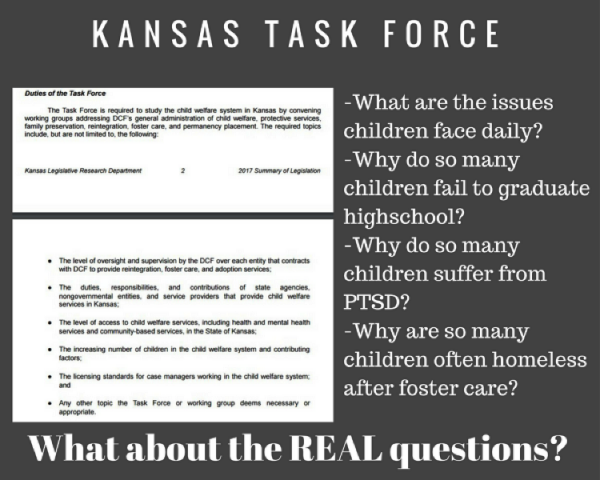
An effective problem solver understands the importance of getting to the root cause of a problem, instead of focusing on the symptoms. Let’s look at this via a metaphor.
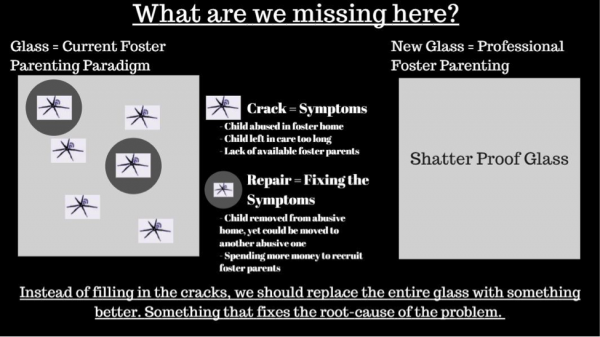
5. Be Candid
“Indecision and delays are the parents of failure.” – George Canning
One thing the foster care system lacks is a culture of openness and candor. With the lives of young children on the line, we must create a culture of calling it like it is. If you see something stupid, then call it like it is. Let’s see how legendary football coach Bill Parcells would approach this topic:
“I’ll call somebody ‘dumb’ or ‘stupid’ if they make a dumb or stupid play. I don’t know any other word for it, and if they don’t like the word, that’s too bad.”
So, how can a leader create a candid culture? Joseph Grenny at the Harvard Business Review recommends the following 4 ways.
1. Praise Publicly. This is more about influencing those who hear it than those who receive it.
2. Prime the Pump. Encourage leaders to bring up and discuss tough questions.
3. Lead by Teaching. Leaders should personally teach sessions, for which the article calls “crucial conversations” and by teaching these skills, a leader shows vested interest in open conversations.
4. Sacrifice Ego. Leaders should sacrifice their ego in order to show how much they value candor and openness. This allows people to feel safe around you.
Here is the reason why being candid is so important in foster care. The Kansas Task Force is seeking to make a change and they might succeed. However, the key is how they define change. If they are seeking change just for the sake of change, then they will succeed; but they must seek the right change. If they fail to get this right, we will see another generation of foster children continue to suffer.
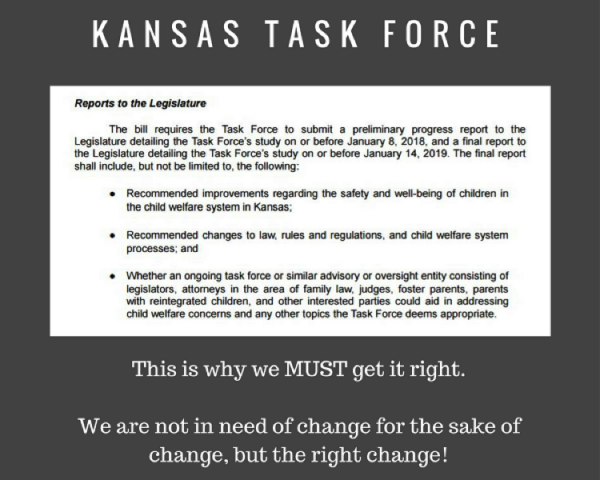
In Why the World Doesn’t Seem to Make Sense, Steven Hagen wrote about something called Great Doubt. This is when you experience immediate, silent, unnamable doubt. Try the following: hold out your hand and look at it. If you doubt you are looking at your hand at this very moment, then you are experiencing Great Doubt.
Prior to death, we seem to finally wake up and a feeling overtakes us at that moment we are about to die. Hagen writes, “Great Doubt can come at moments when we’re overwhelmed by a profound sense of this cannot be, this cannot be!”
We have been discussing Good Leaders throughout this article. However, Great Leaders are able to wake up before this experience. Great Leaders in foster care clearly see the problems that are staring them right in the face. It’s like looking at our knuckles and saying we don’t see anything.







